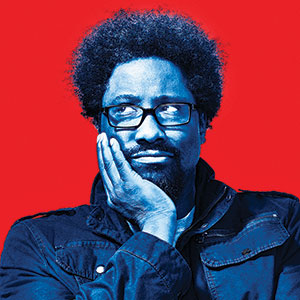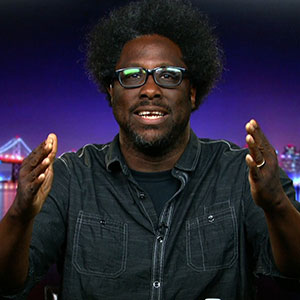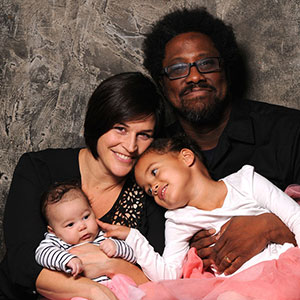

Despite the prevalance of comedians infusing their work with social commentary, W. Kamau Bell stands distinct. Atop his successful stand-up career, Bell kicked off the third season of his CNN show, United Shades of America, on April 29. On Shades, Bell acts as a sherpa for the couch-bound to discover America. Rather than mostly mock people from confines of a New York studio, Bell travels the nation to allow the most talked-about subgroups in the country explain themselveseven members of the Ku Klux Klan and alt-right leader Richard Spencer.
Bell makes a point of attempting to shake people out of their preconceived notions, not that he believes he’ll save the world. A disciple of Jon Stewart’s school of blending humor and insight while covering the news, he sees the praise that he and others originally heaped upon this style of comedy as a bit naive.
“We exaggerated what Jon Stewart was doing,” Bell says. “He spoke truth to power, but that doesn’t mean power is always listening. All we’re doing is helping people process the world. So now, maybe John Oliver gets credit for people knowing what net neutrality actually is, but that doesn’t mean he saved the internet. We overemphasize the power of jokes.”
Bell’s provocative style of comedy made him Santa Clara University’s pick for the Frank Sinatra Chair Artist in Residence. His wife, Melissa, graduated from the university and later taught dance there. Currently, he has an office in an art facility that still has that new building smell and a foyer featuring a huge hand-blown glass sculpture by popular (and expensive) artist Dale Chihuly. It’s a pretty good set-upone Bell recognizes he could ruin at any second.
“We’re in an era now where everybody’s one tweet away from losing their job and their livelihood. Everybody,” Bell says, noting the one possible exception: the president. “Comics are in the position where our job is to say provocative things, because even if you’re not saying something controversial, making somebody laugh is provocative, like, ‘I didn’t expect you to say that!'”
But Bell is interested in more than simply wringing a laugh out of the latest news cycle. He strives to make larger points. One of the Emmy award-winner’s most potent personal anecdotes involves his experience of being mistaken for a panhandler at a now-closed Berkeley cafe when he came to visit his white wife and mixed-race child.
His story closely resembles the recent headline-grabbing police action at a Starbucks in Philadelphia. On April 12, two black men were arrested while waiting to hold a business meeting at the coffee shop chain. The cause for cuffs, according to Starbucks, was “trespassing” as the men declined requests from store employees that they order something while they waited for a third individual to arrive. The incident drew the ire of activists who learned of it through social media and insisted the arrests were at the very least subconsciously, if not overtly, informed by racism.
“All of America’s racism is connected,” Bell wrote in an op-ed in Berkeleyside on the occasion of the arrest and the Berkeley cafe’s concurrent closure. “Racism isn’t just a coffee shop problem. It is an America problem. And as much as many people don’t want to admit it, Berkeley is in America.”
In a region where roughly 80 percent of voters rejected Trump, Bell acts as a necessary reminder of racism’s sneaky prevalence. Santa Clara’s selection of him as artist-in-residence reaffirms the university’s commitment to educating their students with diverse viewpoints. But that organizational outlook isn’t always reflected in the student body. In recent years, vandals have defaced school property with racist and homophobic messages. These episodes testify to the durability of the intolerance baked into American culture.
TALKING IT OUT
If Trump has done anything, Bell says, he proved that Americans were not baptized of their original sin of racism by electing a black president. The relative peacefulness of the eight Obama years obscured simmering resentment in tens of millions of Americans who elected a man that pledged to be vicious to practically every marginalized community in America. Now, Bell says, to act as though the stakes haven’t ratcheted up is irresponsible.


“People have to take sides,” Kamau says. “People say [the county’s] divided. It’s always been divided. But you were allowed to pretend like it didn’t involve you. You were allowed to believe that your lack of engagement was actually a side. And now, if you’re not engaged, then you’re on the wrong side. Then you’re hurting the people who are trying to make things better.”
Kamau’s method of making things better has been to go out into America and expose CNN’s viewers to communities they may not have otherwise met. His third season’s first episode will take Americans to the border, where Trump has ordered the National Guard to stand watch until his wall is builtwhich may be never. So far, Bell’s interviewed Chicago gang members, Muslims in small towns, Appalachian coal miners and, most controversially, white nationalist Richard Spencer at a conference for the alt-right.
In the era of epic clapbacks, Bell tones down the verbal violence that characterizes so many internet conversations. Even though Spencer essentially would prefer if no one who looked like Bell lived in America, Bell doesn’t attack him with a cathartic dressing down. Instead, most of the time, he allows Spencer to make his points.
Unlike similar shows that can veer toward making their subjects into straw men, Bell gives his viewers the full Spencer experience, while still checking Spencer’s most preposterously false claims by splicing in cheeky post-production clips to set the record straight. For example, Spencer poses a hypothetical: without Europe, what civilization would have sailed out into uncharted waters?
Kamau answers: “Literally every other civilization that’s been by the water” while a cutaway animation presents depictions of ancient African and Asian seafarers.
Still, many online felt that Bell gave Spencer a platform where his views would be legitimized and spread. Until then, Spencer was mostly known to the broader public, if at all, as that racist who got punched in the face during a live television interviewa reputation many felt was fitting and shouldn’t be salvaged by a national media appearance, although Spencer has also been featured on ABC News and the in pages of The Atlantic, among other prominent mainstream media appearances.
But by encouraging Spencer to speak freely, Bell goads him into hanging himself by his own words and making his racism seem like little more than the demented ramblings of a pathetic mansuch as Spencer’s “horror” at the prospect of a black James Bond. History has somewhat vindicated Bell’s approach. Even if his ideas persist, Spencer’s pretty irrelevant, as is provocative alt-right speaker Milo Yiannopoulos and Trump’s supposed puppet-master: Steve Bannon.
To borrow a phrase from DJ Khaled, once these leaders get national exposure, they tend to play themselves.
GETTING REAL
“Bannon’s like Darth Vader, but if Darth Vader died halfway through the first Star Wars movie,” Kamau says with a laugh. “People were like, ‘You should have torn [Spencer] a new asshole.’ But at the end of the day, it doesn’t mean that you actually did anything. It doesn’t enact anything. Nobody disappears after an epic clapback.”
He makes the astute observation that YouTube is chock-full of clips of progressives and conservatives debating. The same clip will be labeled under one title proclaiming the conservative “destroyed” the progressive. While right underneath it, the same clip bears a different title stating it was, in fact, the conversative who was “destroyed.” It’s a potent example of how the internet has eroded America’s ability to agree upon what we’re seeing.
But perhaps the internet just exacerbated a natural human tendency. In a 2014 study, Duke University researchers found that respondents would reject the validity of a problem if the solution went against their political beliefs.
When self-identifying Republicans believe addressing climate change will result in economic catastrophe, a majority reject the overwhelming science behind the phenomenon. But when they read about free markets being the solution, a slight majority supports the science. The trend also applied to liberals on issues like gun control.
So if most online dialogues are like professional ping-pong matches with each side just whaling shots at each other with loads of spin, Bell’s conversations feel more like backyard rallies at a Fourth of July party. The more relaxed tone may not be as engagingly combative as other cable news showdowns. But perhaps it might lead to more solutions that would convince disbelievers that problems exist.
These mostly arise during the panel segments of his show, where Bell maintains a clear perspective but also steps back and allows others to fill in the gaps to create a nearly all-encompassing worldview.
To this point, Bell prides himself that he’s been able to use his platform to elevate people from backgrounds and experts on issues that may fall outside of the typical fodder for cable news. By deferring to these other authorities, Bell not only broadens the discussion, but also broadens expectations of what type of people can occupy what roles in our society.
“Our first two daughters were born during the era of Barack Obama,” Bell says. “They just sort of take it for granted in a way that me and my wife are not taking it for granted. Now our new daughter is going to be born as a Trump baby, and that makes representation super important because it lets you know what’s available to you.”
By way of example, he brings up his daughters’ favorite television program, Doc McStuffins, which features a black female doctor as the central character. “So our daughters just assume that black women are doctors,” he says while noting that although Hollywood has made strides in broadening representation, the industry is still lacking for other ethnic groups, sexual orientations and those with disabilities.
“Every year we celebrate some able-bodied person for playing a disabled person,” he says. “And meanwhile, there are disabled actors.”
PUSH & PULL
Although Bell feels that we may have exaggerated the impact of speaking truth to power through comedy, it certainly does seem to open at least some people up to new ideas. People may prefer entertainment with which they philosophically agree, but they may also be willing to entertain new perspectives if it comes with a laugh.
A mix of humility and pride seeps into Bell’s voice when he mentions the older, white conservative man who came up to him at a mutual friend’s wedding and thanked him for shifting his perspective through his unique style of observation. He says he’s heard from children, parents and grandparents that his is the program all three generations can agree to watch.
But Bell hopes people don’t just watch his show. He wants to push them to act, particularly if they’re lucky enough to reside in places where the chilling effects of the Trump administration aren’t so acutely feltsuch as the verdant grounds of Santa Clara University.
“We have to sacrifice and make some big changes to make the world a better place,” Bell says. “Those of us with privilege have more responsibility to make the world a better place. Because we have the time, resources and some of us have the skin complexion to get into the halls of power.”
Here, Bell can’t help but make a crack that he feels as though “every white person in America is only like two phone calls away from a meeting with Trump,” a quip that also highlights that most of the students around him possess connections that can be used for much more than just securing a cushy internship after graduation.
But he isn’t a fatalist who sees Trump’s election as the first domino in America’s fall. Rather, he sees Trump as a reaction consistent with America’s history of meeting progression with regression. Slavery led to abolition, which led to Jim Crow, which led to the civil rights movement, which led to the law and order era, which filled prisons with people from communities of color, which is now leading to an increased demand for criminal justice reform.
“It’s all cyclical,” he says. “We’re not going to be in this era of America forever.”
Using his platform, Bell has helped to poke holes in the boxes that Americans stereotypically slot people into when they’re too cloistered, ignorant or lazy to get to know them better. And unlike some other comedians who host shows similar to his, Bell knows what it’s like to reside in a body that, no matter what heights he ascends to, will be regarded as dangerous by many because he is tall and black.
So while most hosts can sympathize and express anger at what happened to those two young men at a Starbucks in Philadelphia, Bell knows exactly what it’s like to have an otherwise ordinary day disrupted by the dehumanizing realization that you aren’t as welcome in a place because of the way you look, because of factors outside of your control.
As a self-proclaimed “blerd” or black nerd, he says his upbringing was tough at times because he felt like an outcast. He struggled to find those who looked and acted like him in his daily life or in popular media. But in that difficult period, he laid the foundation for his current success.
“You start off feeling like, ‘Oh my God, I’m a misfit…'” Bell recalls. “For the comic book analogy, it’s no different than finding out you’re one of the X-Men. You’re like, ‘Oh my God, I have these laser powers… Wait, I can save the world!’ You think it’s the problem and then at some point you realize it’s your strength, it’s your solution.”



